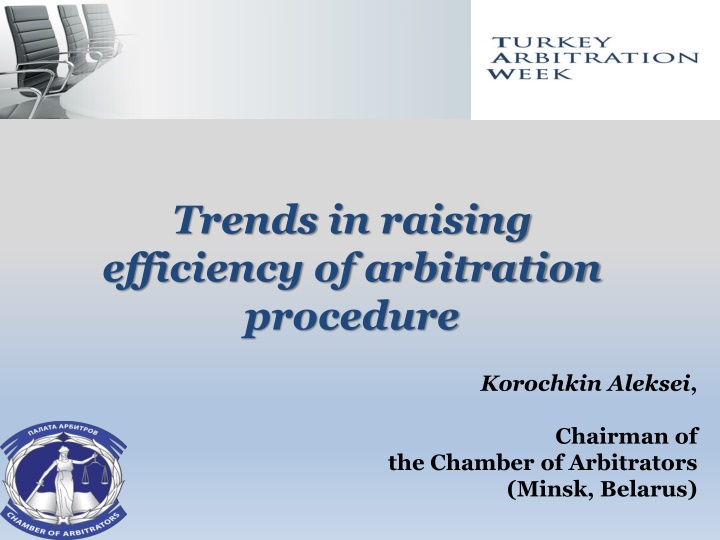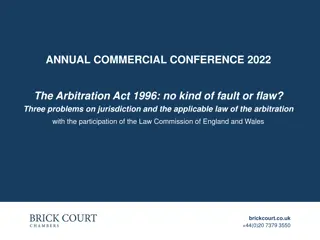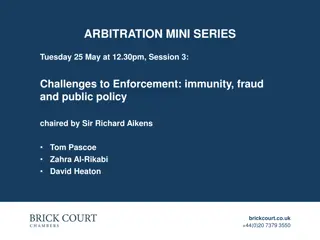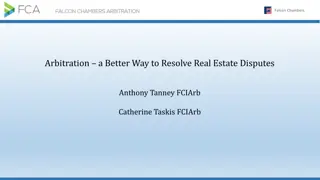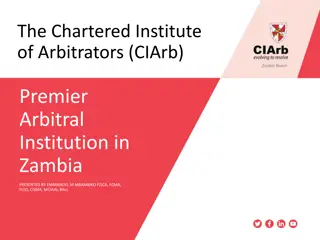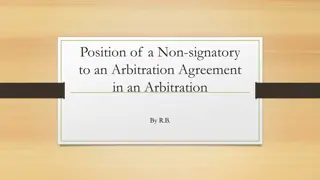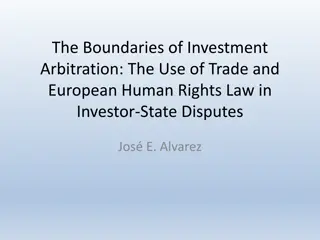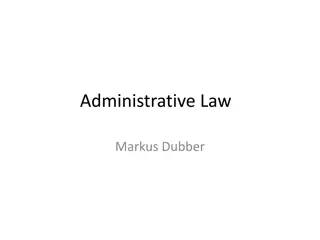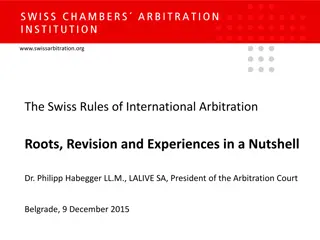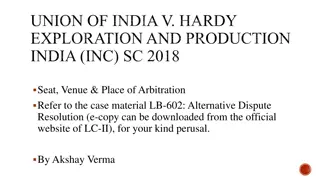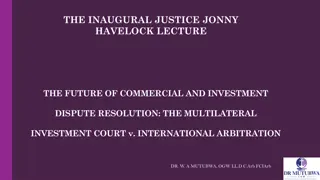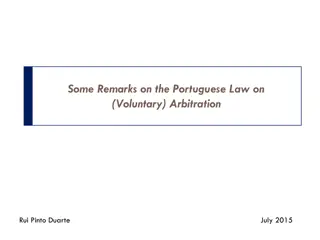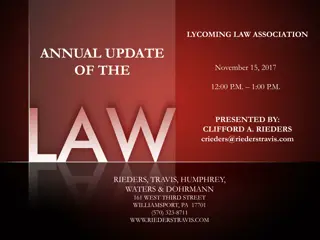Trends in Raising Efficiency of Arbitration Procedure
Explore the latest trends in enhancing the efficiency of arbitration procedures, including neutral evaluation with neutral counsel, SCC Express for quick dispute resolution, and consolidation of claims under CIETAC and SCC rules. These approaches aim to streamline conflict resolution processes and provide faster, cost-effective solutions for resolving disputes.
Download Presentation

Please find below an Image/Link to download the presentation.
The content on the website is provided AS IS for your information and personal use only. It may not be sold, licensed, or shared on other websites without obtaining consent from the author.If you encounter any issues during the download, it is possible that the publisher has removed the file from their server.
You are allowed to download the files provided on this website for personal or commercial use, subject to the condition that they are used lawfully. All files are the property of their respective owners.
The content on the website is provided AS IS for your information and personal use only. It may not be sold, licensed, or shared on other websites without obtaining consent from the author.
E N D
Presentation Transcript
Trends in raising efficiency of arbitration procedure Korochkin Aleksei, Chairman of the Chamber of Arbitrators (Minsk, Belarus)
1.Neutral evaluation CIS ICSD at the Economic Court of the CIS conciliation procedure with neutral counsel Neutral counsel express an advisory opinion on the most favorable result of conflict resolution, which can be obtained during the resolution of the dispute in judicial or arbitration bodies. The advisory opinion of the neutral adviser contains references to the norms of law applicable to the dispute, an analysis of the factual side of the case, as well as the arguments that became the basis for formulating the presented opinion. The advisory opinion is not an arbitral award and is not binding on the parties.
Neutral evaluation SCC Express SCC Express is a dispute resolution tool designed to help resolve a disagreement between business partners on an issue that needs to be investigated quickly, and where there is a wish to explore an alternative to a full-length arbitration or court proceeding. SCC Express is a fast and simple way to get a neutral, legal assessment of the disputed matter by a neutral, experienced expert The assessment is carried out within three weeks against a fixed fee of EUR 29 000.
2.Consolidation of Claims If we have disputes: 1)between the same parties; 2)arise in connection with the same legal relationship, and; 3)the arbitration agreements are compatible. Can we combine these disputes in one claim?
Consolidation of Claims CIETAC Rules Article 14 Multiple Contracts The Claimant may initiate a single arbitration concerning disputes arising out of or in connection with multiple contracts, provided that: (a) such contracts consist of a principal contract and its ancillary contract(s), or such contracts involve the same parties as well as legal relationships of the same nature; (b) the disputes arise out of the same transaction or the same series of transactions; and (c) the arbitration agreements in such contracts are identical or compatible.
Consolidation of Claims SCC Rules Article 14 Multiple contracts in a single arbitration (1) Parties may make claims arising out of or in connection with more than one contract in a single arbitration. (3) In deciding whether the claims shall proceed in a single arbitration, the Board shall consult with the parties and shall have regard to: (i) whether the arbitration agreements under which the claims are made are compatible; (ii) whether the relief sought arises out of the same transaction or series of transactions; (iii) the efficiency and expeditiousness of the proceedings; and (iv) any other relevant circumstances.
3.Separate arbitral award Arbitration Rules of the Chamber of Arbitrators Arbitration fee should be paid by both parties before the constitution of the arbitral tribunal If the respondent fails to pay his share of the arbitration fee and the claimant pays for this share, the arbitral tribunal may issue a separate arbitral award (regardless of consideration of the dispute on the merits) to recover from the respondent in favor of the claimant the share of the arbitration fee paid for the respondent (Article 6.2).
4.Discretionary Arbitration Arbitration Rules of the Chamber of Arbitrators Article 17 (1) Subject to these Rules and to the agreement of the parties, the arbitral tribunal may conduct the arbitration in such manner as it considers appropriate, provided that the parties are treated with equality and that at an appropriate stage of the proceedings each party is given a reasonable opportunity of presenting its case. The arbitral tribunal, in exercising its discretion, shall conduct the proceedings so as to avoid unnecessary delay and expense and to provide a fair and efficient process for resolving the parties dispute.
5.Digital Arbitration -E-mail communications -Virtual hearings -Online witness examinations -Online tribunal deliberations, etc
6.State court facilitation - interim measures; - award challenging procedure; - recognition and enforcement.
Belarusian court rulings (public policy rules) The application of a public policy clause must be strictly reasoned and well-grounded, as a detailed statement of the reasons and grounds for refusing recognition or enforcement contributes to the development of more consistent practice in reaching a consensus on principles and rules that can be considered part of public policy. If the part of the award that does not violate public policy can be separated from the part that does not violate it, then the part of the award that does not violate public order may be recognized and enforced. The misapplication of legal norms cannot be regarded as a violation of public policy, since the court can draw a conclusion on the wrong application of legal norms only if all the materials of the case have been studied and the decision has been reconsidered on the merits.
Belarusian court rulings (mandatory rules) Distinctive features of a mandatory norm may be the following: this norm must be contained either in an international act or in a legislative act of the national legal system; this norm is intended to protect the foundations of the national legal order, must contain a special social significance; an additional sign of a mandatory norm may be the measures established by legislation that consolidate the negative consequences for persons who have violated these norms. In cases where the mandatory norms of the law of several foreign states claim to regulate the disputed legal relationship, the priority should be given to the norms that have the closest connection with the legal relationship. When determining with which foreign state the legal relationship has the closest connection, the economic courts should first of all proceed from the consideration of the alleged place of execution of the court decision.
THANK YOU FOR YOUR ATTENTION! KOROCHKIN ALEKSEI Chairman of the Chamber of Arbitrators Chairman of the Sports Arbitration Court (Minsk, Belarus) Head of Minsk Regional Specialized Legal Advice Office on Judicial Support to Business Advocate, mediator, PhD, associate professor korochkin@buro24.by +375 29 617 24 24
